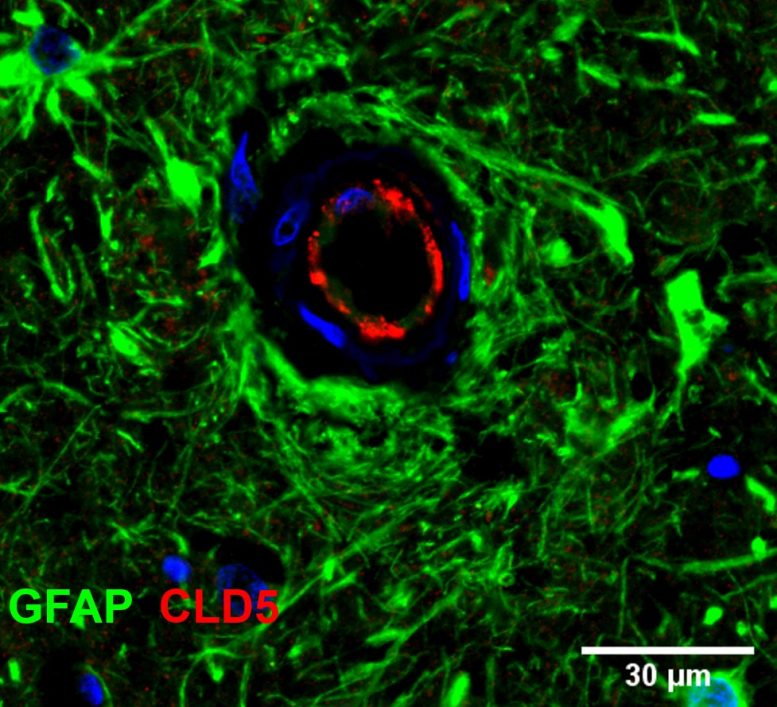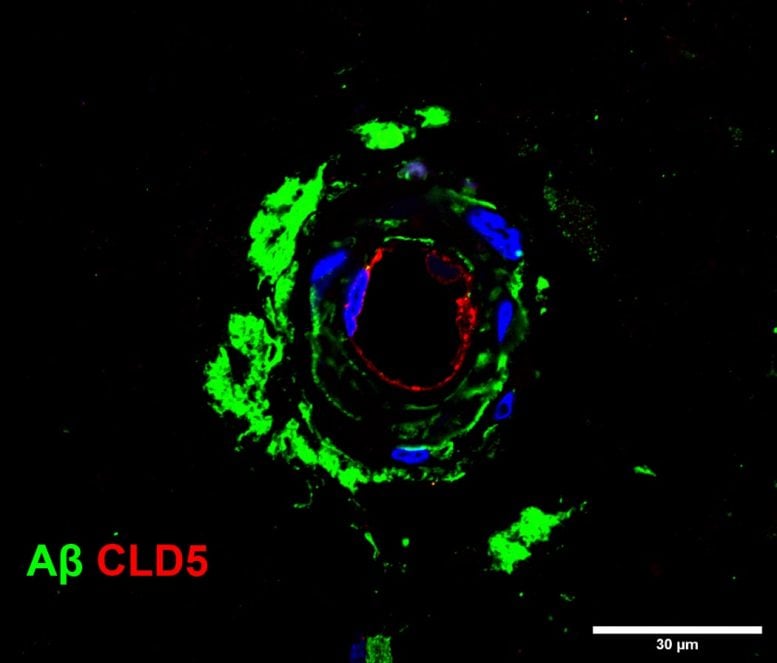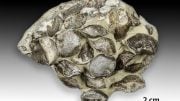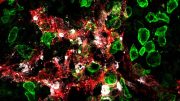
This image shows Glial fibrillary acidic protein (GFAP) and Claudin-5 staining of an affected cell. Credit: Trinity College Dublin
Scientists at Trinity College Dublin today announced a significant advance in our understanding of an early onset form of dementia that may also progress our understanding of conditions such as Alzheimer’s disease.
Adult onset Leukoencephalopathy with axonal Spheroids and Pigmented glia (ALSP) is an ultra-rare condition characterized by mutations in a gene called Colony stimulating factor-1 receptor (CSF1R). The condition manifests initially with psychiatric and behavioral changes in patients followed by a rapid progression of dementia in the third or fourth decade of life. While the condition is very rare, for affected families it can represent a devastating diagnosis.
As the condition involves the degeneration of white matter in the brain, scientists previously thought that immune cells within the brain termed microglia were the primary culprits in driving pathology observed in this condition.
However, the Trinity team, working with patient samples as well as pre-clinical models, were able to show that dysfunctional circulating white blood cells were the key driver of neurodegeneration.
“This was fundamentally a translational research project, where data obtained from patient samples critically informed the direction of our pre-clinical studies. Our findings have shed light on a novel mechanism of neurodegeneration that may ultimately teach us more about common forms of dementia,” said Dr Matthew Campbell, Associate Professor at Trinity.
Importantly, the work has identified that a disruption in CSF1R function in patients, as well as in pre-clinical models, induces damage to the so-called blood-brain barrier (BBB). This damage can subsequently change the integrity of capillaries in the brain, causing them to leak and spark the deterioration of the brain. Intriguingly, dysfunctional white blood cells seem to be the main driver of this BBB breakdown.
Relevance to other dementias
Unfortunately, there are currently no approved therapies for conditions such as Alzheimer’s disease, which is in part due to the lack of a robust understanding of the early initiators of the disease. If we can better understand what the early hallmarks of Alzheimer’s are, we may be able to develop novel forms of therapy that target these newly discovered mechanistic pathways.

Amyloid-beta and Claudin-5 staining in the brain of a patient with ALSP. Credit: Trinity College Dublin
Dr. Conor Delaney, Irish Research Council scholar, Postdoctoral research fellow, and first author of the study, added: “The most exciting aspect of our study is that we have now honed in on a novel pathway that to date has not been explored in great detail. Additionally, our data suggest that modifying white blood cell function may be therapeutically relevant for progressive neurodegenerative conditions.”
A multidisciplinary team of geneticists, immunologists, neurologists, and neuropathologists from Trinity, the Royal College of Surgeons Ireland (RCSI), University College Cork (UCC), Sligo General Hospital and the University of Ghent undertook the study.
While shedding light on an often-neglected rare disease, the findings could pave the way for a targeted therapeutic approach for other forms of dementia.
Commenting on the clinical significance of the findings, Colin Doherty, Professor of Epilepsy in Trinity, said: “It is absolutely critical that we focus our research endeavors on identifying the underlying cause of neurodegenerative conditions. Studies like these will pave the way for better clinical management of our patients and hopefully, new medicines to treat the condition.”
Reference: “Attenuated CSF‐1R signalling drives cerebrovascular pathology” by Conor Delaney, Michael Farrell, Colin P Doherty, Kiva Brennan, Eoin O’Keeffe, Chris Greene, Kieva Byrne, Eoin Kelly, Niamh Birmingham, Paula Hickey, Simon Cronin, Savvas N Savvides, Sarah L Doyle and Matthew Campbell, 22 December 2020, EMBO Molecular Medicine.
DOI: 10.15252/emmm.202012889
The research, published this week in the international journal, EMBO Molecular Medicine, was supported by the Irish Research Council (IRC), Science Foundation Ireland (SFI) – Future Neuro Centre, the St James’s Hospital Foundation, and the Ellen Mayston Bates bequest in the Trinity Foundation.









I have Celiac Sprue and MTHFR gene mutation the rarest form of MTHFR Gene mutation. I have not been able to finish my treatments. I have Lipoma and do not absorb my vitamin B or iron at all through my digestive system. I haven’t been to the doctor in a year since covid-19. I take liquid iron in order to keep myself from having blood infusions. I know vitamin b is essential for brain health and alzheimer’s is related to low levels of vitamin B. I am worried because I need to find a way to get my vitamin b to absorb into my bloodstream. I know folic acid is not good to take and I am trying methylfolate B12 now because I have been hallucinating. I am only 50 but I was misdiagnosed for my genetic disorder and it’s been hard the past 10 years. The damage to my system is not good. Thank you for your article. It’s scary to know that my brain is suffering because of covid-19 and lack of medical care for my health issues.
Great
With all due respect to the scientists who have researched on this topic of ‘DEMENTIA’ with a great degree of work and success. Yes, you have almost pin pointed the cause of the dementia. You will continue to build your research on the research further, while burying the real cause for dementia. The remark is not to be-little your scientific medical research.
As a layman I have always questioned, not as a skeptic but as a logical person…. what is the real cause for all the disfunction?
If you wish to know and discuss, it would enable the research community to resolve this issue quickly. I will lookforward to your e-mail.
Just a note: often complex issues are resolved through unsuspected sources.